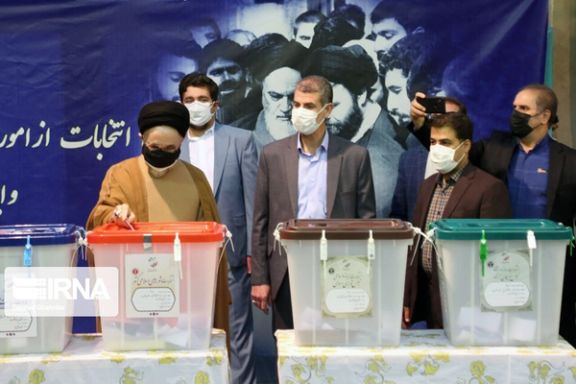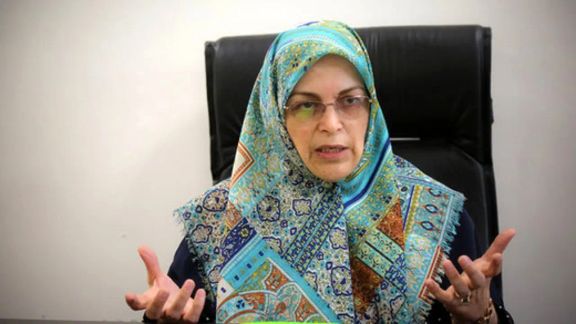Iran’s Reformists View Khatami's Election Abstention As Significant

Reformists are lauding former President Mohammad Khatami as “a winner” for not voting in Iran’s “stage-managed” elections, although some social media users question his motives.

Reformists are lauding former President Mohammad Khatami as “a winner” for not voting in Iran’s “stage-managed” elections, although some social media users question his motives.
For the first time in his political career, the formerly popular reformist president refrained from voting, despite Supreme Leader Ali Khamenei’s repeated declarations that voting is a religious duty. Khatami has not made any statements since Friday’s polls regarding his abstention.
Reformist parties and groups such as the Etehad-e Mellat (Nation’s Unity) party, who were denied having any candidates, did not outrightly boycott the elections, but declined endorsement of any candidates .
In a tweet after the closure of the polls, the leader of the Reforms Front, Azar Mansouri, confirmed that Khatami had not voted and said this was in accordance with the Reformist’s previously announced strategy.

Ali Nazari, editor of Mostaghel (Independent) newspaper, tweeted that not voting caused “Khatami’s voice to be heard,” adding that a year ago, the reformist leader had issued a statement about the crisis in the country and written a comprehensive letter to Khamenei, to which he never received a response.
Former Reformist lawmaker Mahmoud Sadeghi said that Khatami's abstention was in accordance with a 15-point statement he issued last year during popular protests, and called it “a source of grand transformations for the Reformists.”
“The winner of Friday’s elections was Mohammad Khatami, who returned to the people's arms,” a Khatami supporter tweeted.
Some other social media users, however, allege that Khatami’s political act was masterminded by the regime to mislead the people and preserve clerical rule with “turban-wearing opposition”.
“Khatami did not vote to look like one of us, so that in 1404 (2025) he has the legitimacy to invite people to participate in the presidential elections ... For whatever reason he didn't vote, his intention was to hurt us,” another tweet said.
“Reformists have a very small window to return to the fold of the people … They will never have a chance in Iran's future if this is only a warning to the government [after which] they will return to their factory setting [position],” another tweet said.
Khatami issued the statement referred to by Sadeghi on February 19, 2023, in the wake of the regime’s brutal crackdown on Woman, Life, Freedom protesters. Some reformist figures such as Behzad Nabavi, then a member of the presiding board of the Reform Front, said later that they considered the statement as “the manifesto of reformism”.
In the statement Khatami had stressed that people had the right to be disillusioned with Reformists just as they are with the ruling system but suggested non-violence and civil methods as the only way forward.
The system’s attempts to “satisfy a small part of the society that it considers loyal to itself” at the cost of dissatisfaction of the “majority of the society who … have lost hope in a better future” was “a big mistake” that the ruling system was making, he said in the statement.
“System” and “ruling system” are often used by politicians in Iran and the media to refer to Supreme Leader Ali Khamenei and his loyalists in power.
While stressing that “physical overthrow” of the powerful government by the ordinary people was not plausible, Khatami urged the “ruling system” in his statement to “reform itself” and called for fair, free, and competitive elections, freedom of all political prisoners, freedom of the media, and the rule of law.
More significantly, he advocated for the reform of several critical state institutions, including the Guardian Council and Expediency Council, both of which are appointed by Khamenei. Additionally, he urged for the cessation of the Khamenei-controlled military's interference in politics and a shift in foreign policy direction, moving from isolationism to engagement with the global community.
He emphasized that the Assembly of Experts should fulfill its responsibility of overseeing the performance of the Supreme Leader and entities under his authority. Furthermore, he advocated for the cessation of the Guardian Council's "arbitrary supervision," which has enabled it to eliminate all political rivals in elections, according to Khatami's statement.
In February Khatami had asserted that the March 1 elections were far from being free, fair, and competitive and had spoken of widespread dissatisfaction among educated youth, elites, as well as “over 50 percent of the population who abstained from voting in the 2020 and 2021 elections” and “the millions who had cast blank votes in the past few elections” including the presidential elections of 2021.
Elections of the parliament and Assembly of Experts Friday had the lowest turnout in the four-decade history of the Islamic Republic despite Supreme Leader Ali Khamenei’s repeated pleas to the people to vote.
In some constituencies the number of blank and invalid votes is higher than the constituency’s top elected representative. These votes are usually cast by those who may have been rounded up and forced to vote against their wish such as government employees, soldiers, and athletes. The high volume of blank votes has gradually turned into a characteristic of every election in the past decade.